Resume
Home Care Nurse Cover Letter Examples

May 29, 2025
|
12 min read
Crafting a standout home care nurse cover letter: Learn how to stitch together your experience and compassion to make your application shine. We’ll help you find the right words to "nurse" your way to success.
4.70 Average rating
Rated by 348 people
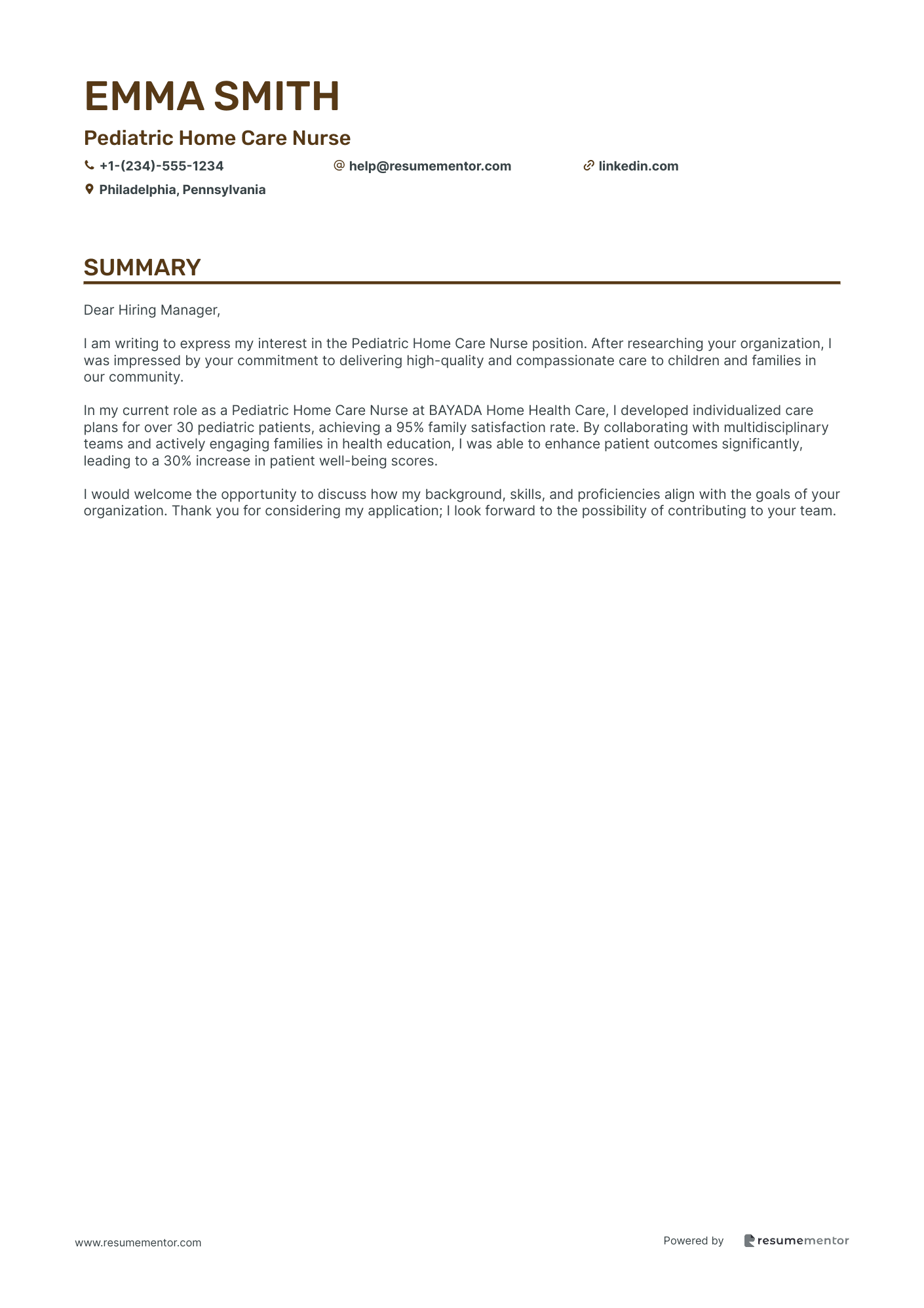
Pediatric Home Care Nurse
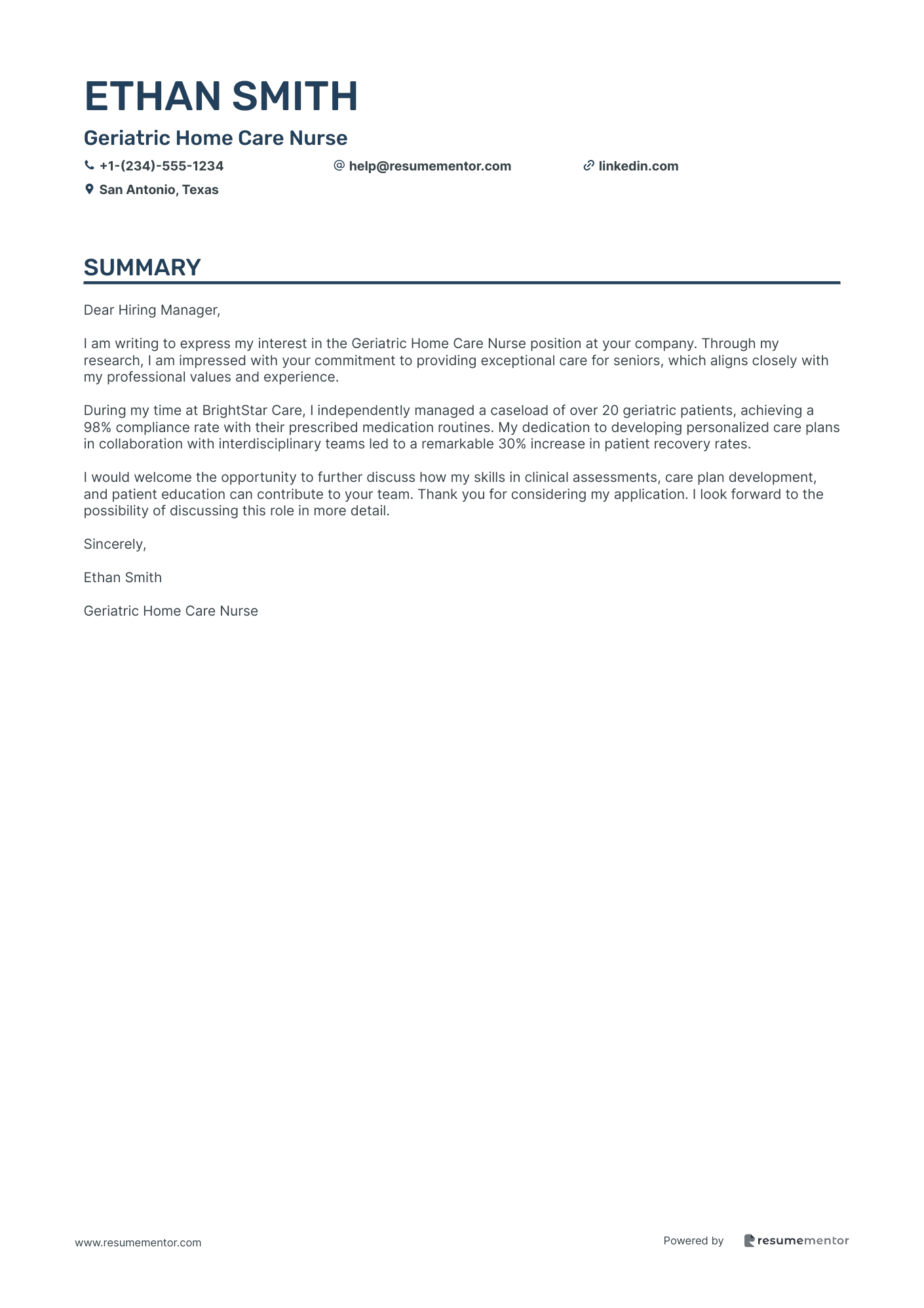
Geriatric Home Care Nurse
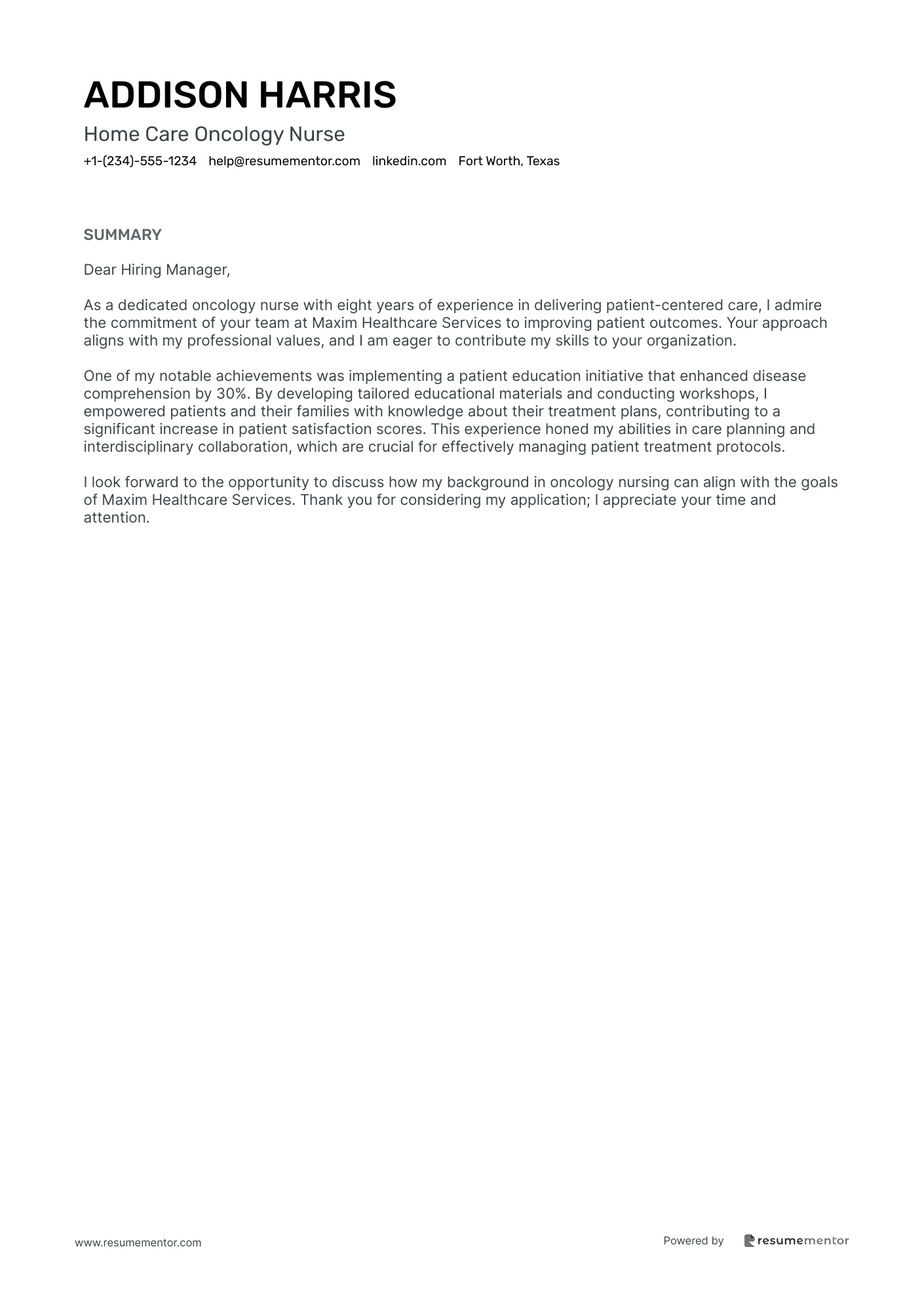
Home Care Oncology Nurse
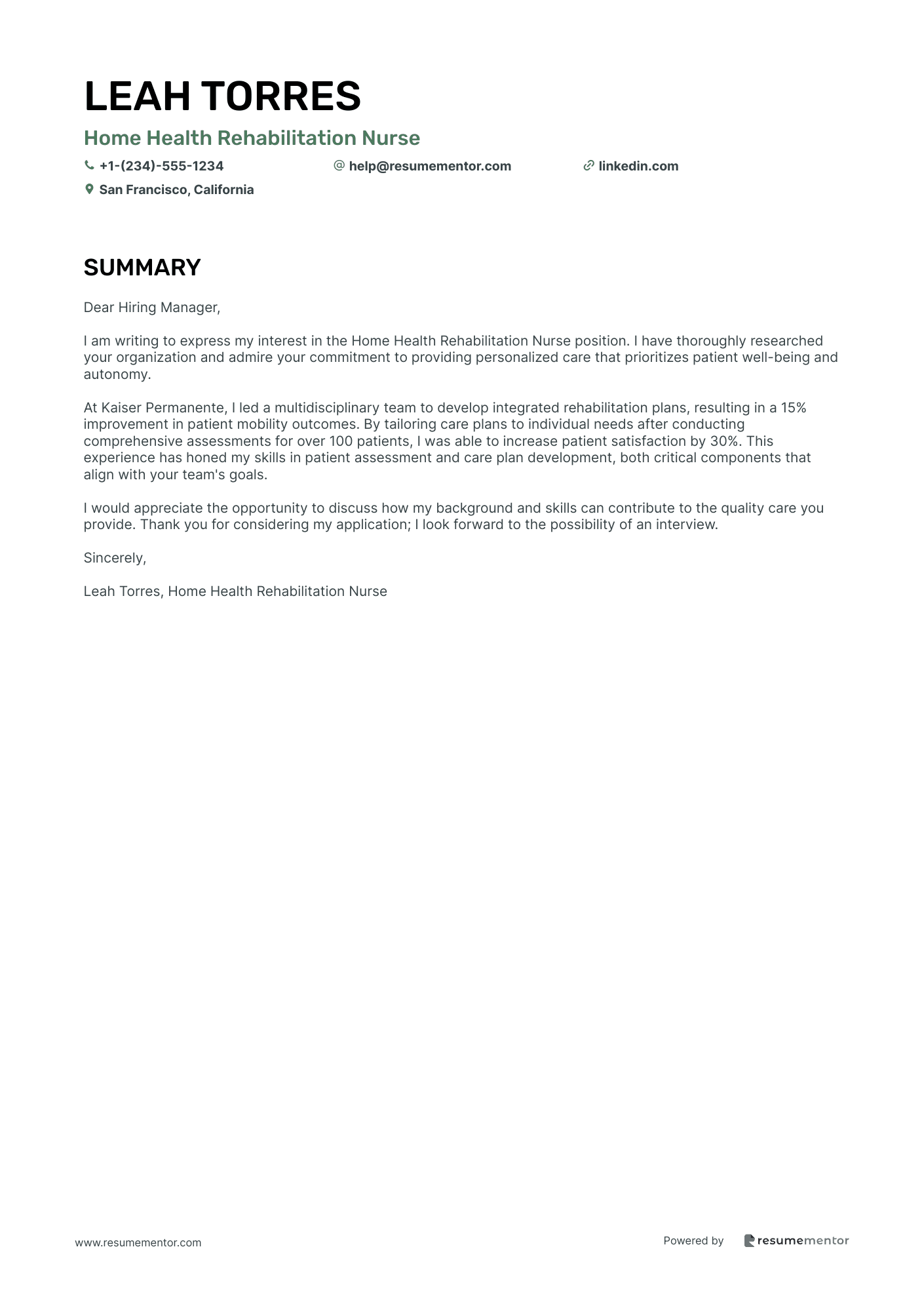
Home Health Rehabilitation Nurse
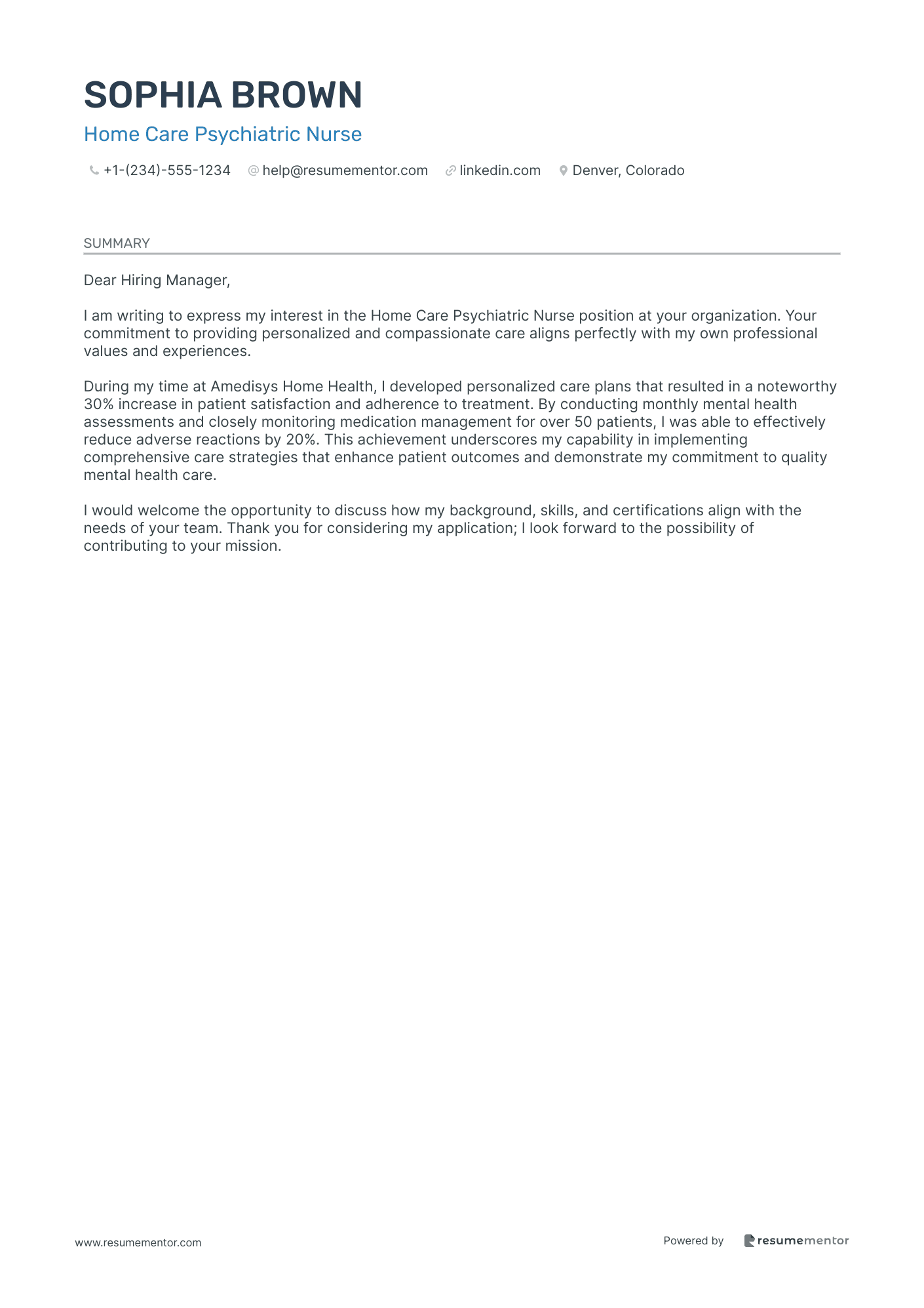
Home Care Psychiatric Nurse
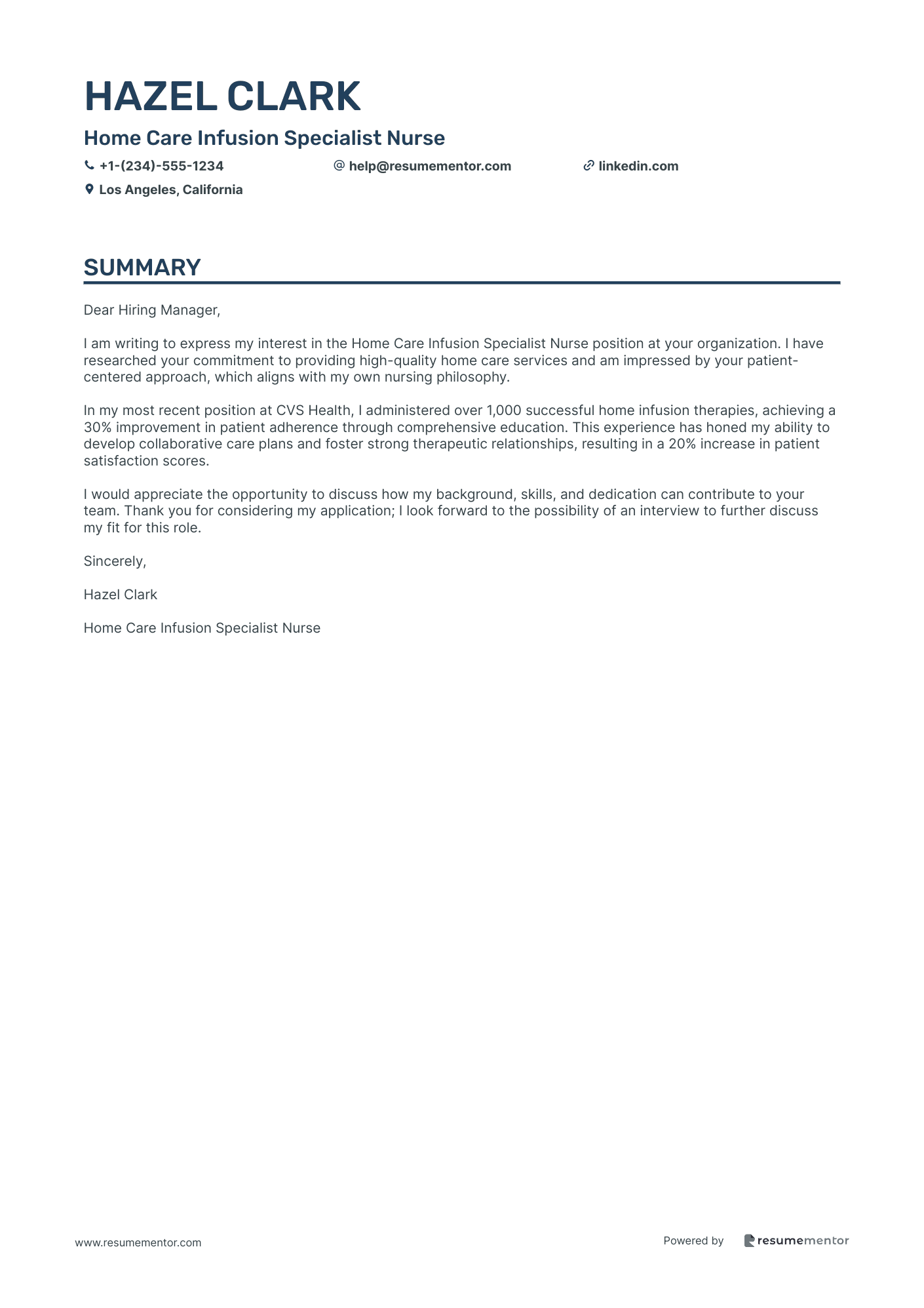
Home Care Infusion Specialist Nurse
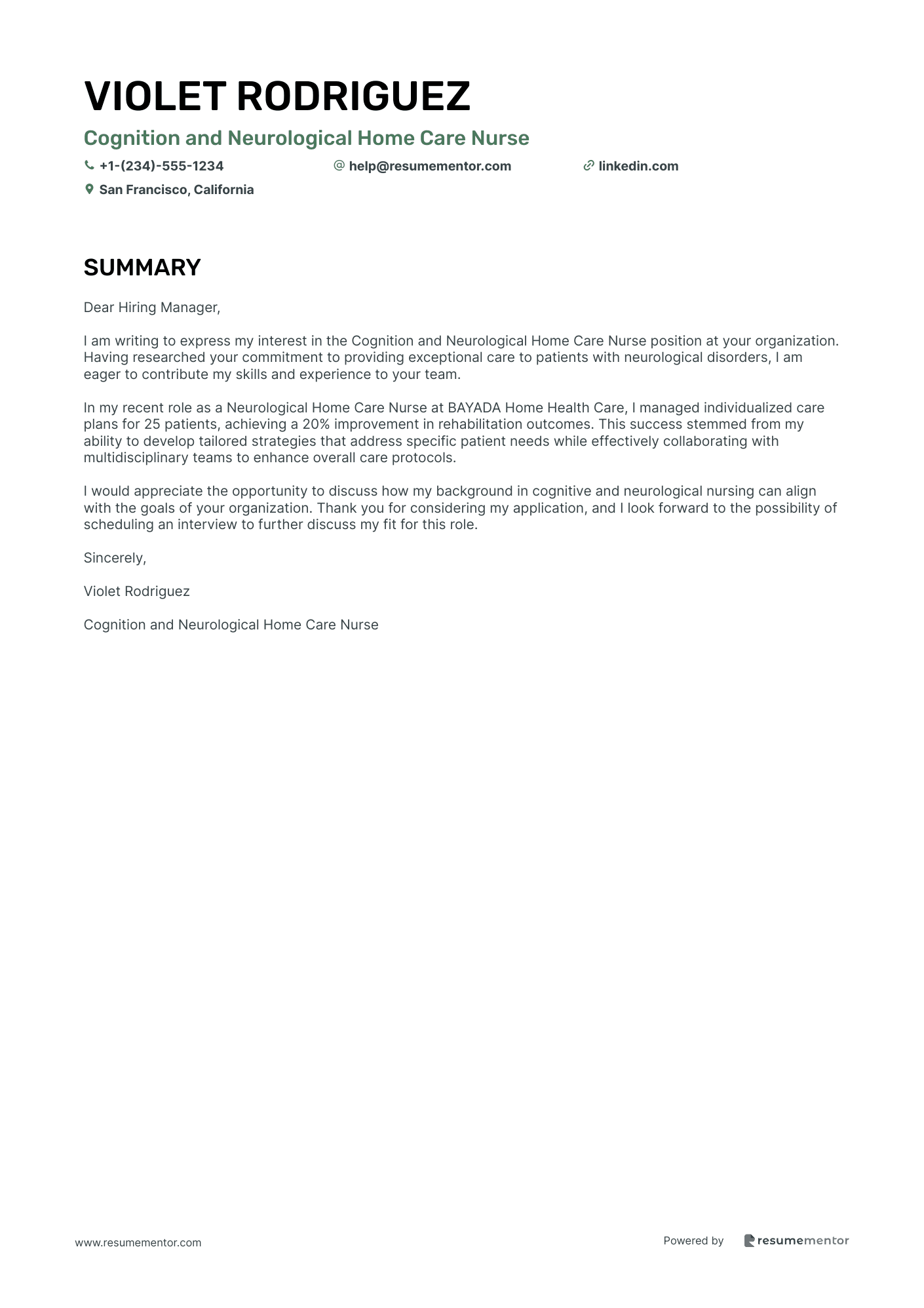
Cognition and Neurological Home Care Nurse
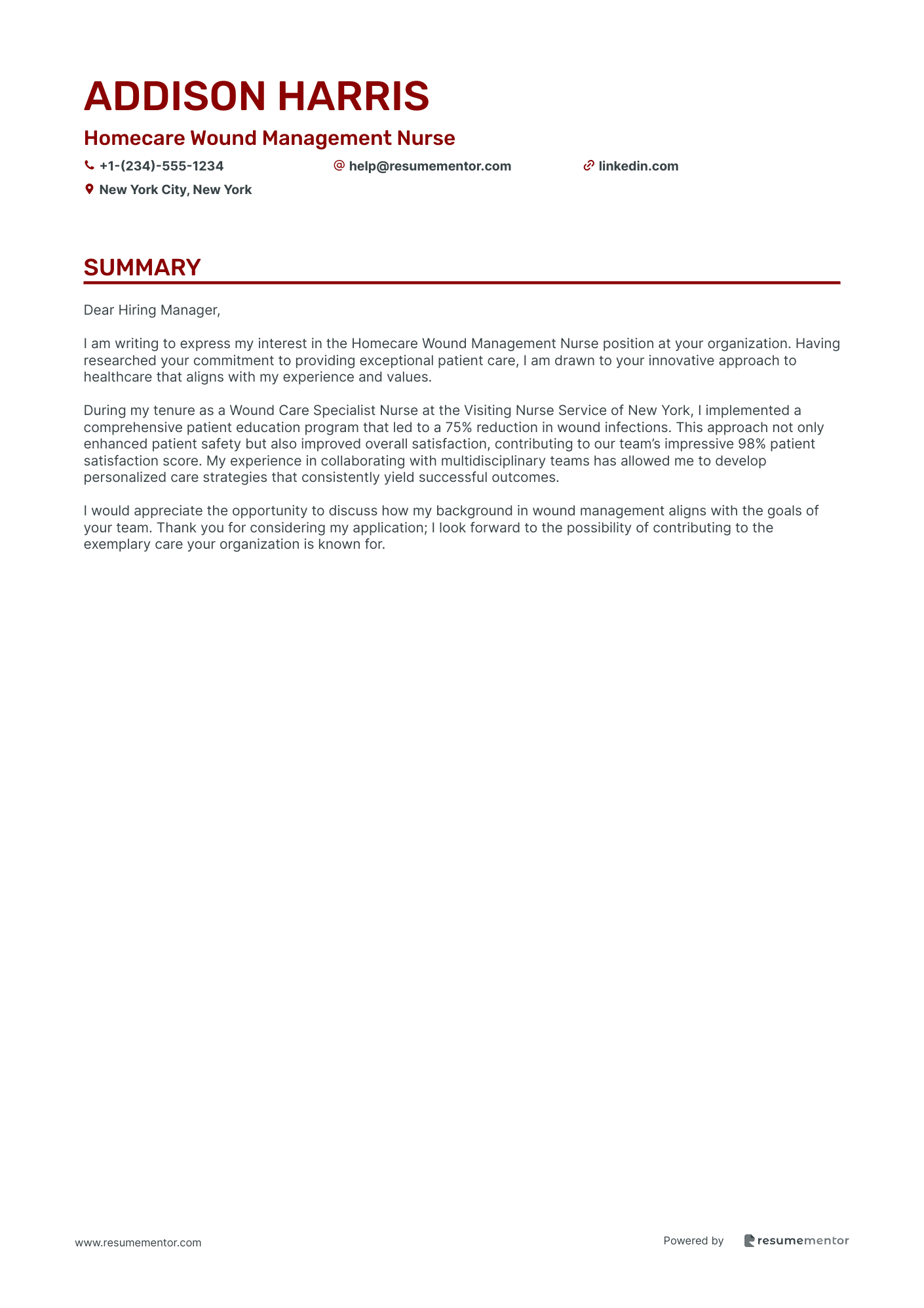
Homecare Wound Management Nurse
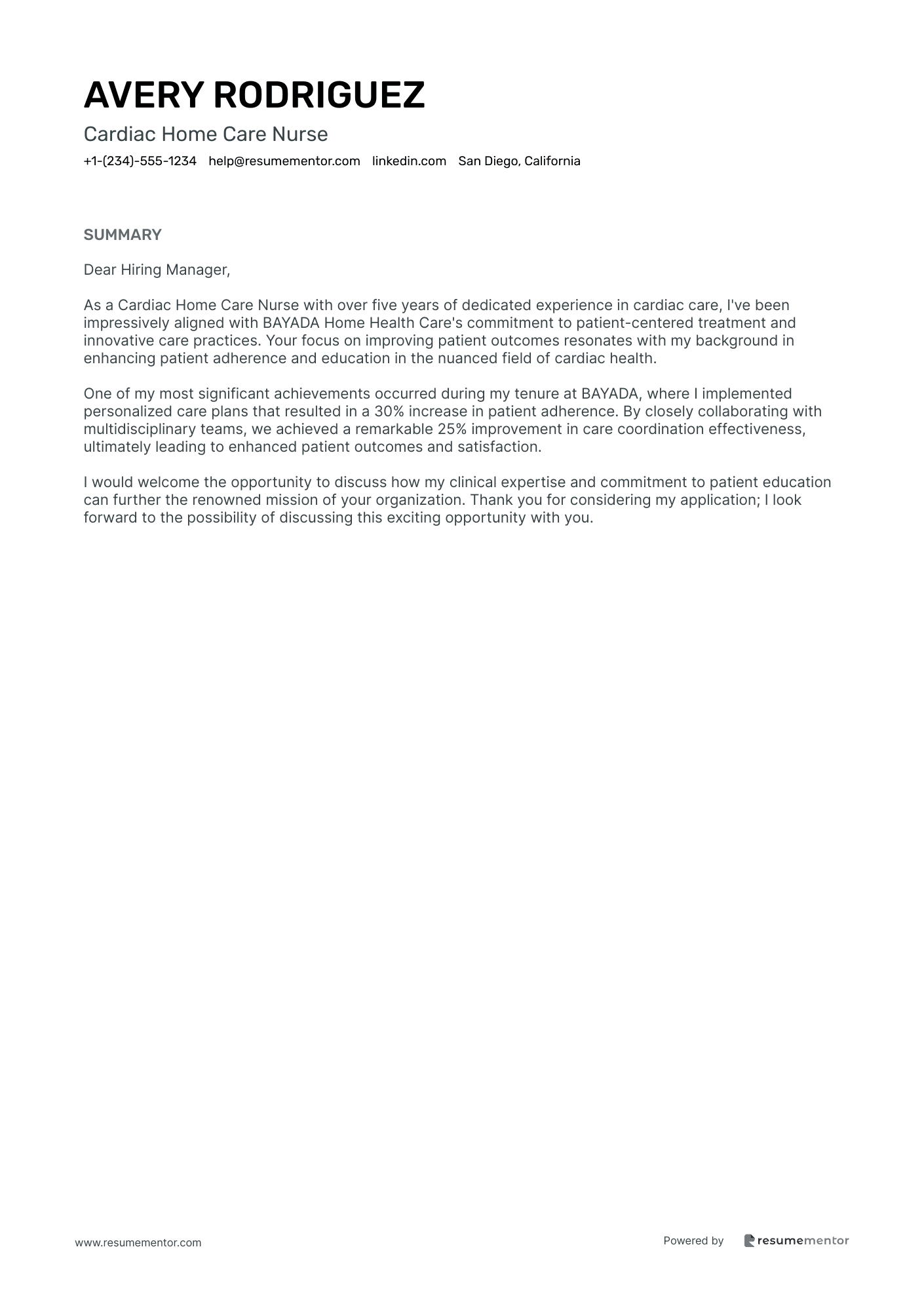
Cardiac Home Care Nurse
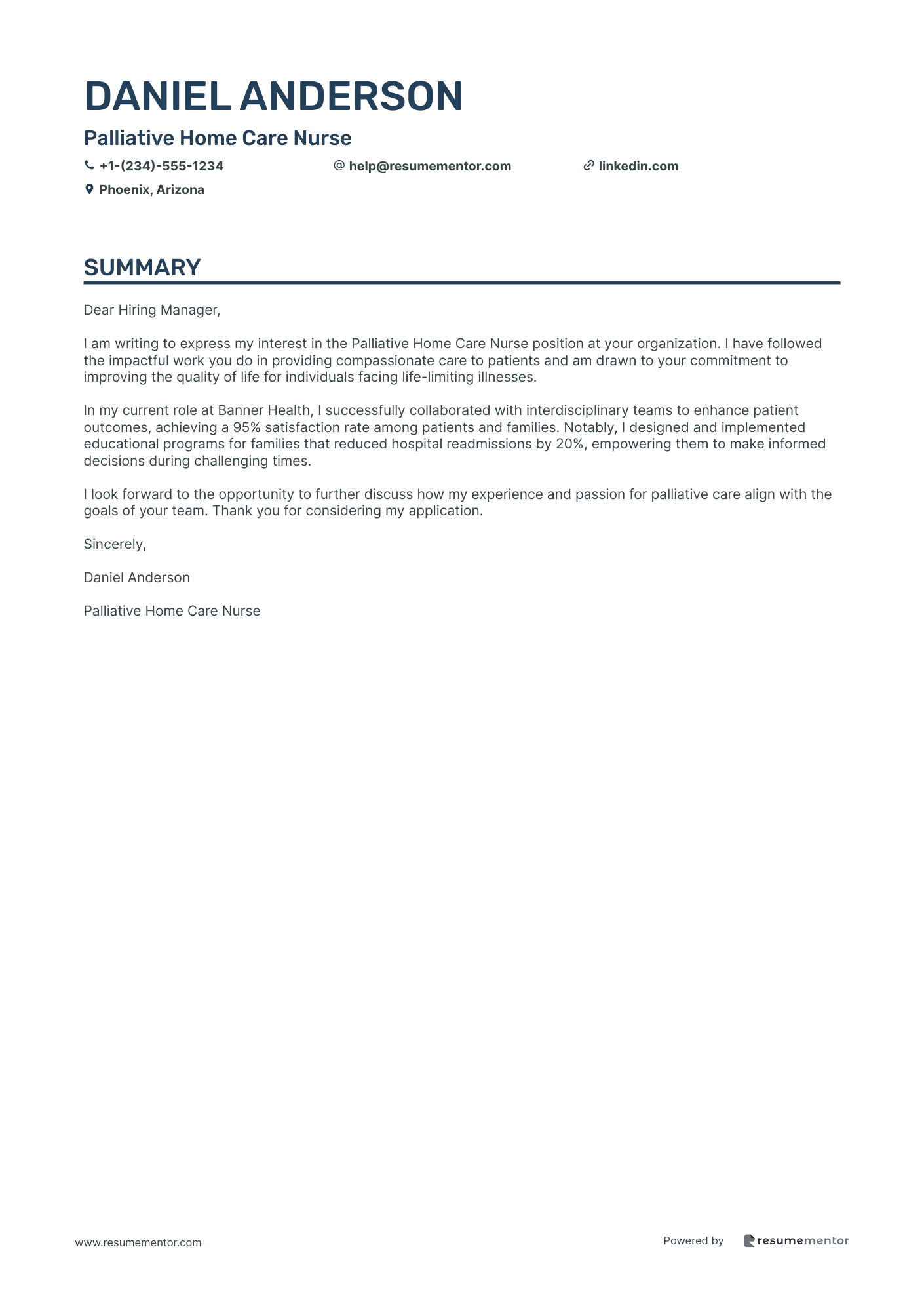
Palliative Home Care Nurse

Pediatric Home Care Nurse cover letter sample
When applying for this role, it’s essential to highlight any relevant nursing experience, particularly with children. Focus on your ability to communicate effectively with both young patients and their families. If you've received specialized training in pediatric care or certifications, such as Pediatric Advanced Life Support, include these details to showcase your qualifications. Share specific instances where your nursing skills improved patient outcomes or streamlined care routines, emphasizing the positive impact on both the children and their families. Use clear examples to support your claims.
Emma Smith
Pediatric Home Care Nurse
Summary
Dear Hiring Manager,
I am writing to express my interest in the Pediatric Home Care Nurse position. After researching your organization, I was impressed by your commitment to delivering high-quality and compassionate care to children and families in our community.
In my current role as a Pediatric Home Care Nurse at BAYADA Home Health Care, I developed individualized care plans for over 30 pediatric patients, achieving a 95% family satisfaction rate. By collaborating with multidisciplinary teams and actively engaging families in health education, I was able to enhance patient outcomes significantly, leading to a 30% increase in patient well-being scores.
I would welcome the opportunity to discuss how my background, skills, and proficiencies align with the goals of your organization. Thank you for considering my application; I look forward to the possibility of contributing to your team.
Geriatric Home Care Nurse cover letter sample
When applying for this position, it is important to highlight any previous experience in geriatric care or nursing. Emphasize your compassion and ability to communicate effectively with elderly patients and their families. Mention any certifications in geriatrics or home health care you have obtained, along with details about the duration of those programs. Include specific examples of how you have improved patient outcomes or provided quality care, using the 'skill-action-result' framework to illustrate your impact on previous patients' well-being.
Ethan Smith
Geriatric Home Care Nurse
Summary
Dear Hiring Manager,
I am writing to express my interest in the Geriatric Home Care Nurse position at your company. Through my research, I am impressed with your commitment to providing exceptional care for seniors, which aligns closely with my professional values and experience.
During my time at BrightStar Care, I independently managed a caseload of over 20 geriatric patients, achieving a 98% compliance rate with their prescribed medication routines. My dedication to developing personalized care plans in collaboration with interdisciplinary teams led to a remarkable 30% increase in patient recovery rates.
I would welcome the opportunity to further discuss how my skills in clinical assessments, care plan development, and patient education can contribute to your team. Thank you for considering my application. I look forward to the possibility of discussing this role in more detail.
Sincerely,
Ethan Smith
Geriatric Home Care Nurse
Home Care Oncology Nurse cover letter sample
When applying for this role, it's important to emphasize any previous oncology or nursing experience. Highlight your nursing certifications, particularly in oncology or palliative care, to demonstrate your expertise. Strong interpersonal skills and the ability to provide emotional support are essential, as you will interact closely with patients and their families. Include examples of how you've successfully managed patient care or collaborated with a healthcare team. Use a 'skill-action-result' format to showcase your impact on patient outcomes and overall satisfaction.
Addison Harris
Home Care Oncology Nurse
Summary
Dear Hiring Manager,
As a dedicated oncology nurse with eight years of experience in delivering patient-centered care, I admire the commitment of your team at Maxim Healthcare Services to improving patient outcomes. Your approach aligns with my professional values, and I am eager to contribute my skills to your organization.
One of my notable achievements was implementing a patient education initiative that enhanced disease comprehension by 30%. By developing tailored educational materials and conducting workshops, I empowered patients and their families with knowledge about their treatment plans, contributing to a significant increase in patient satisfaction scores. This experience honed my abilities in care planning and interdisciplinary collaboration, which are crucial for effectively managing patient treatment protocols.
I look forward to the opportunity to discuss how my background in oncology nursing can align with the goals of Maxim Healthcare Services. Thank you for considering my application; I appreciate your time and attention.
Home Health Rehabilitation Nurse cover letter sample
When applying for this role, it’s important to emphasize your clinical experience, especially in rehabilitation and home care settings. Highlight any certifications, such as a Basic Life Support (BLS) or Certified Rehabilitation Registered Nurse (CRRN), to establish your qualifications. Be sure to detail specific patient outcomes you've achieved, using the 'skill-action-result' format. For instance, mention how your patient management skills improved recovery times or patient satisfaction scores. Show how your compassionate approach has positively affected patient well-being and independence, making your application stand out.
Leah Torres
Home Health Rehabilitation Nurse
Summary
Dear Hiring Manager,
I am writing to express my interest in the Home Health Rehabilitation Nurse position. I have thoroughly researched your organization and admire your commitment to providing personalized care that prioritizes patient well-being and autonomy.
At Kaiser Permanente, I led a multidisciplinary team to develop integrated rehabilitation plans, resulting in a 15% improvement in patient mobility outcomes. By tailoring care plans to individual needs after conducting comprehensive assessments for over 100 patients, I was able to increase patient satisfaction by 30%. This experience has honed my skills in patient assessment and care plan development, both critical components that align with your team's goals.
I would appreciate the opportunity to discuss how my background and skills can contribute to the quality care you provide. Thank you for considering my application; I look forward to the possibility of an interview.
Sincerely,
Leah Torres, Home Health Rehabilitation Nurse
Home Care Psychiatric Nurse cover letter sample
When applying for this position, emphasize any experience you have working with patients with mental health issues. Highlight your ability to provide compassionate care and support. Certifications in mental health or nursing will strengthen your application, so include those, noting the duration of your training. Describe specific instances where your interventions led to improved patient outcomes, using the 'skill-action-result' structure. This could include examples of crisis management or therapeutic communication, showcasing your effectiveness in enhancing patient well-being and satisfaction.
Sophia Brown
Home Care Psychiatric Nurse
Summary
Dear Hiring Manager,
I am writing to express my interest in the Home Care Psychiatric Nurse position at your organization. Your commitment to providing personalized and compassionate care aligns perfectly with my own professional values and experiences.
During my time at Amedisys Home Health, I developed personalized care plans that resulted in a noteworthy 30% increase in patient satisfaction and adherence to treatment. By conducting monthly mental health assessments and closely monitoring medication management for over 50 patients, I was able to effectively reduce adverse reactions by 20%. This achievement underscores my capability in implementing comprehensive care strategies that enhance patient outcomes and demonstrate my commitment to quality mental health care.
I would welcome the opportunity to discuss how my background, skills, and certifications align with the needs of your team. Thank you for considering my application; I look forward to the possibility of contributing to your mission.
Home Care Infusion Specialist Nurse cover letter sample
When crafting your cover letter, focus on your clinical experience and certifications related to home care or infusion therapy. Highlight any specialized training or courses that showcase your knowledge in medication administration and patient assessment. Mention your ability to build rapport with patients and their families, emphasizing skills in education and support. Use the 'skill-action-result' format to illustrate how you've improved patient outcomes or streamlined processes in prior roles. This approach will demonstrate your impact and commitment to delivering high-quality care.
Hazel Clark
Home Care Infusion Specialist Nurse
Summary
Dear Hiring Manager,
I am writing to express my interest in the Home Care Infusion Specialist Nurse position at your organization. I have researched your commitment to providing high-quality home care services and am impressed by your patient-centered approach, which aligns with my own nursing philosophy.
In my most recent position at CVS Health, I administered over 1,000 successful home infusion therapies, achieving a 30% improvement in patient adherence through comprehensive education. This experience has honed my ability to develop collaborative care plans and foster strong therapeutic relationships, resulting in a 20% increase in patient satisfaction scores.
I would appreciate the opportunity to discuss how my background, skills, and dedication can contribute to your team. Thank you for considering my application; I look forward to the possibility of an interview to further discuss my fit for this role.
Sincerely,
Hazel Clark
Home Care Infusion Specialist Nurse
Cognition and Neurological Home Care Nurse cover letter sample
When applying for this role, it’s important to showcase any relevant clinical experience, particularly in neurology or rehabilitation. Highlight your ability to assess patient needs, manage care plans, and provide emotional support. Certifications in specialized caregiving or coursework in neuroanatomy can enhance your application. Demonstrate your skills by providing examples of how you’ve improved patient outcomes, such as reducing hospital readmissions or enhancing daily living activities. Use clear metrics to illustrate your contributions and the direct impact on patients’ quality of life.
Violet Rodriguez
Cognition and Neurological Home Care Nurse
Summary
Dear Hiring Manager,
I am writing to express my interest in the Cognition and Neurological Home Care Nurse position at your organization. Having researched your commitment to providing exceptional care to patients with neurological disorders, I am eager to contribute my skills and experience to your team.
In my recent role as a Neurological Home Care Nurse at BAYADA Home Health Care, I managed individualized care plans for 25 patients, achieving a 20% improvement in rehabilitation outcomes. This success stemmed from my ability to develop tailored strategies that address specific patient needs while effectively collaborating with multidisciplinary teams to enhance overall care protocols.
I would appreciate the opportunity to discuss how my background in cognitive and neurological nursing can align with the goals of your organization. Thank you for considering my application, and I look forward to the possibility of scheduling an interview to further discuss my fit for this role.
Sincerely,
Violet Rodriguez
Cognition and Neurological Home Care Nurse
Homecare Wound Management Nurse cover letter sample
When writing your cover letter, focus on your clinical experience in wound care. Highlight any specific certifications you hold, such as wound certification or specialized training in pressure ulcer management. Be sure to mention your familiarity with assessment tools and treatment plans. Provide examples of successful interventions you've implemented, using the 'skill-action-result' method to illustrate your impact. Emphasize your ability to educate patients and families on wound care practices, as this shows your commitment to improving health outcomes and patient satisfaction.
Addison Harris
Homecare Wound Management Nurse
Summary
Dear Hiring Manager,
I am writing to express my interest in the Homecare Wound Management Nurse position at your organization. Having researched your commitment to providing exceptional patient care, I am drawn to your innovative approach to healthcare that aligns with my experience and values.
During my tenure as a Wound Care Specialist Nurse at the Visiting Nurse Service of New York, I implemented a comprehensive patient education program that led to a 75% reduction in wound infections. This approach not only enhanced patient safety but also improved overall satisfaction, contributing to our team’s impressive 98% patient satisfaction score. My experience in collaborating with multidisciplinary teams has allowed me to develop personalized care strategies that consistently yield successful outcomes.
I would appreciate the opportunity to discuss how my background in wound management aligns with the goals of your team. Thank you for considering my application; I look forward to the possibility of contributing to the exemplary care your organization is known for.
Cardiac Home Care Nurse cover letter sample
When applying for this role, emphasize any experience in cardiac nursing or home care. Highlight your ability to assess patients' conditions and develop care plans tailored to individual needs. Mention certifications like 'Basic Life Support' or 'Cardiovascular Care' to show your qualifications. Showcase your strong interpersonal skills, as building trust with patients is essential. Include examples of how you've improved patient outcomes or compliance with treatment plans, using a 'skill-action-result' approach to demonstrate your effectiveness in previous positions.
Avery Rodriguez
Cardiac Home Care Nurse
Summary
Dear Hiring Manager,
As a Cardiac Home Care Nurse with over five years of dedicated experience in cardiac care, I've been impressively aligned with BAYADA Home Health Care's commitment to patient-centered treatment and innovative care practices. Your focus on improving patient outcomes resonates with my background in enhancing patient adherence and education in the nuanced field of cardiac health.
One of my most significant achievements occurred during my tenure at BAYADA, where I implemented personalized care plans that resulted in a 30% increase in patient adherence. By closely collaborating with multidisciplinary teams, we achieved a remarkable 25% improvement in care coordination effectiveness, ultimately leading to enhanced patient outcomes and satisfaction.
I would welcome the opportunity to discuss how my clinical expertise and commitment to patient education can further the renowned mission of your organization. Thank you for considering my application; I look forward to the possibility of discussing this exciting opportunity with you.
Palliative Home Care Nurse cover letter sample
When applying for this position, emphasize any experience in nursing or healthcare settings focused on symptom management and patient comfort. Highlight your ability to provide compassionate care and support to patients and their families during challenging times. Include any relevant training in pain management, communication, or end-of-life care to showcase your expertise. Use specific examples to demonstrate your ability to create personalized care plans and improve patient outcomes, following a 'skill-action-result' format to reflect your impact on previous patients' quality of life.
Daniel Anderson
Palliative Home Care Nurse
Summary
Dear Hiring Manager,
I am writing to express my interest in the Palliative Home Care Nurse position at your organization. I have followed the impactful work you do in providing compassionate care to patients and am drawn to your commitment to improving the quality of life for individuals facing life-limiting illnesses.
In my current role at Banner Health, I successfully collaborated with interdisciplinary teams to enhance patient outcomes, achieving a 95% satisfaction rate among patients and families. Notably, I designed and implemented educational programs for families that reduced hospital readmissions by 20%, empowering them to make informed decisions during challenging times.
I look forward to the opportunity to further discuss how my experience and passion for palliative care align with the goals of your team. Thank you for considering my application.
Sincerely,
Daniel Anderson
Palliative Home Care Nurse
Related Articles

Continue Reading
Check more recommended readings to get the job of your dreams.
Resume
Resources
Tools
© 2026. All rights reserved.
Made with love by people who care.
